The period of admission to kindergarten is a serious stress for children's health and the psyche. It is not surprising that adults are worried whether the child will like the kindergarten, how he will react to changing living conditions, whether he will quickly make friends with teachers, teachers and other children. Let's look at what problems mother and child can expect during the period of admission to kindergarten and how to facilitate the process of adaptation of the child in kindergarten as much as possible.
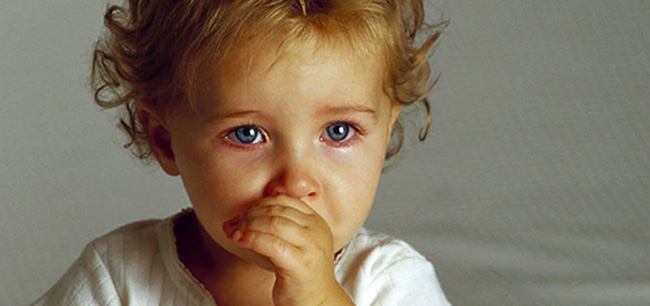
How is the addiction in kindergarten?
Many children at first surprisingly willingly go to the group, rather easily experience separation from their mother, but then roar and scream to protest against their new social status - the kindergartener. Of course, there are kids who do not cry and are happy to rush to the aunt teacher. But there are very few such children, while the rest addictions drag on for many months.
Why is this happening? Psychologists define adaptation as adaptation of an organism to new conditions, requiring huge energy costs from it and often leading to stress. The following changes literally break into the familiar world of a child:
- less personal attention is paid to him;
- daily regimen changes;
- there are no close people;
- have to constantly contact with peers;
- you must obey an unfamiliar adult.
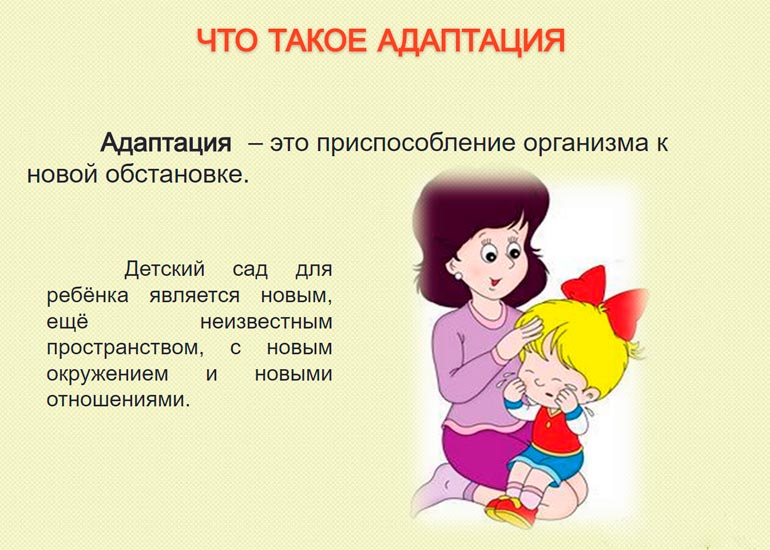
The effects of stress - why do children behave badly?
Changes in children's behavior scare parents so much that they start to think that this “nightmare” will not end and the baby will not be able to get used to the kindergarten. Do not dramatize: negative behavioral patterns are common for many children who get used to the new situation and disappear as they adapt.
- Tears and fear
At first, the baby demonstrates the whole spectrum of negative emotions: soft whimpering, crying after the rest of the kindergarteners and a constant roar. A variety of phobias are aggravated: the baby does not want to enter the group, he is frightened by the teacher and is afraid that they will not come for him. Anger and tantrums, when he does not give off his clothes, is replaced by depression and lethargy.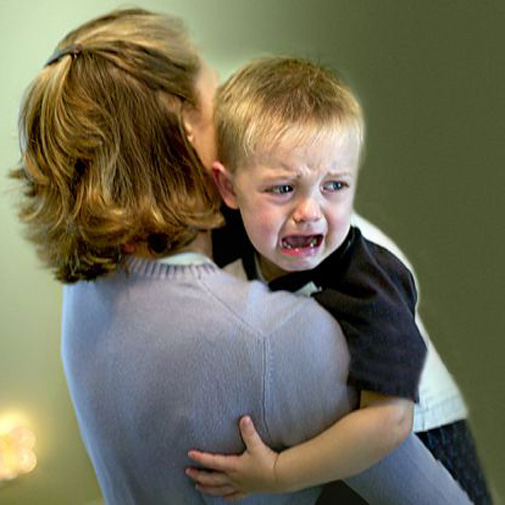
- Decreased sociability
Sometimes even outgoing children become isolated in themselves, refuse to contact with society. This is quite natural - 2-3-year-old kids do not have a role-playing game, they play in parallel to each other.
- Low cognitive interest
Due to overvoltage, children are not interested in bright and attractive toys, it is difficult to involve them in the educational process. The child sits on the sidelines, preferring to observe the actions of adults and classmates.
- Reverse development
The baby “loses” the previously acquired social ones, which he successfully used at home: he stops dressing, uses cutlery, and a pot. Parents are again forced to feed him with a spoon, wash him like a baby.
- Speech degradation
The vocabulary of some children is rapidly decreasing, and instead of sentences you again hear individual “infant” words - for example, Bibika. There are almost no adjectives and nouns in sentences, only verbs remain.
- Change in motor activity
Some babies become hyperactive, others become inhibited and slow. Such changes depend on individual characteristics, primarily on the type of temperament.
- Sleep disturbance
Daytime sleep is practically absent. The teacher does not have time to put the little sick one in the bed, as he begins to sob. And if he falls asleep, then he constantly wakes up and sobs, as if he is haunted by nightmares.
- Decreased appetite
At first, a child may “go on a hunger strike” and even lose weight. So he shows his attitude to unusual food - casseroles and a variety of soups. Some kids categorically refuse to even drink in the kindergarten.
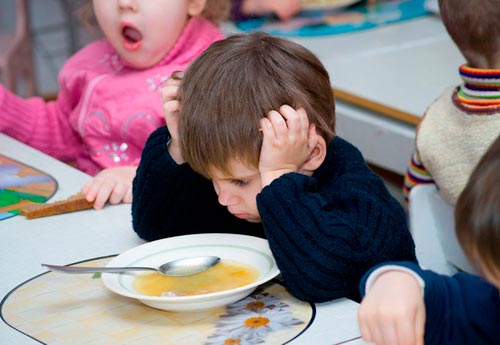
- Frequent diseases
The body's resistance is markedly reduced, any draft is able to disable the child for a week. It is not surprising that each time adaptation has to be started literally from scratch.
We also read: To drive or not to take the child to kindergarten
We prevent maladaptation - we prepare in advance
In order for the addiction to go less painful, you need to go with the baby a few months before entering the garden "Young fighter course" :).
- Encourage self-care initiative in children. If the child knows how to dress, tie the strings on the shoes, drinking from a muguses a spoon sits on a pot, wipes the ass, washes pens - in the group he will begin to feel much more confident. Also, the child should be able to fall asleep on their own - they will not swing on the pens in the kindergarten.
- Prepare for communication with peers: more often go to playgrounds, to visit. Help the baby to make contact by teaching a pattern of behavior: “Boy, what's your name?”, “Look what kind of machine I have,” “Let's play together”.
- Do not bring your child on a study tour to the kindergarten early in the morning when other children are brought there. After all, it is possible that he will see their tears. He may have the opinion that kindergarten is bad. He will ask you a perfectly reasonable question: “Since others are crying here - why should I go there?
- Try to introduce your child to caregivers. He must not just see the very one Auntbut also chat with her in your presence. Wander around the kindergarten, watch the playing preschoolers, with a special emphasis on the fact that parents always take their children home.
- Correct the home mode, making it as similar as possible to the kindergarten daily routine. For example, at 7.40 - awakening, 8.50 - breakfast, 10.40 - morning promenade, noon - lunch, etc. (If you do not know the day mode of your kindergarten, go and take an interest, the teachers will be happy to tell you). Be patient: children are conservative and do not change their habits with a wave of a magic wand. We read a useful article: how to wake a child in kindergarten.
- Prepare the child for the inevitable separation from his beloved mom, leaving the baby with grandmothers and other relatives.
- In order for the child to start breakfast and lunch in the kindergarten as soon as possible, introduce kindergarten dishes into his diet: all kinds of casseroles, fruit soups, vegetable salads.
- The best way to insure against a cold is hardeningthat you can start in the summer. And experts advise not to wrap up children, but to dress them according to the weather.
- Educators and preschool health workers should know in advance about your baby’s individual qualities: health status (e.g. food allergy) and personality traits (emotionality, slowness, tearfulness).
- Raise your child’s self-esteem by presenting the need to attend kindergarten as a kind of work, almost like mom and dad. Just do not embellish reality, gently prepare for possible difficulties so that he does not disappoint.
- Never threaten a baby with a preschool: “You’ll go to kindergarten, they will quickly teach you how to behave!” Remember, this place is not hard labor, but the concentration of knowledge and joy.
Is it possible to combine breastfeeding and kindergarten?
As a consultant on breastfeeding, I often hear this question from a nursing mother when the baby is 2 years old: “How to wean a baby from the breast, because we will soon be in kindergarten?” Is it necessary to excommunicate a child in front of a kindergarten? - read the article
We also read: If parents thought about the consequences of their actions - 4 examples of unsuccessful adaptation to kindergarten and read the article that a child should be able to do in front of a kindergarten - 4 useful skills
VIDEO: 8 LIFEHACKS how to choose a good kindergarten
Hello, kindergarten! Tips on how to teach your child to go to kindergarten
Despite months of preparation, the adaptation phase is inevitable. What should adults do in order not to harm the nervous system of a child who works at maximum speed?
- Teach your child that kindergarten is good. He should not have a fear of this institution. Tell us how good it is in the kindergarten, there are many children, toys, kind teachers. In the kindergarten they play, study, sleep, and in the evening the kids go home.
- Try to develop a positive attitude towards kindergarten in your child. In the presence of children, give a positive assessment of the activities of DOE employees, even if something does not suit you. Tell the kid what wonderful kindergarten he is visiting, how cute the nannies and teachers are.
- Adhere to the "sadikovsky" routine not only on weekdays. Of course, on Saturday you can allow the crumbs to wake up a little later, but the main regimen moments must be strictly observed.
- Create a pleasant and non-conflict atmosphere at home. Do not punish your child for accidental misconduct, on the contrary, praise and caress more often (see article: to punish or not a child for accidental misconduct?) Every achievement should be noted, a change in behavior for the better.
- Give a kind of mother’s substitute to the kindergarten - your favorite soft toy. Clutching it to themselves, children calm down faster and more successfully experience separation from their parents.
- If every morning in the group begins the same way - with tears and unwillingness to let mom go to work, let dad, older sister or other relative take him to the garden.
- When parting, explain when you will be back (after a day's walk, lunch or afternoon snack). Be sure to come on time!Psychologist's advice (to parents): leave the key in the child’s drawer and say that we are going to work, and after work, go after the baby, take the key and go home together. Without a baby and a key, you can’t get home anyway, so take the baby anyway.
- Develop a special ritual of parting: kiss on both cheeks, wave handles, rub your nose. To the baby is not upset, leave immediately - calmly and not paying attention to the screams. Your indecision and anxiety will only intensify his experiences.
- So that the child does not see peers' tears when parting with their mothers, bring him in the first week later - at nine o’clock. So you will wait out the emotional storm in the locker room and not be late for breakfast.
- Leave it for the whole day gradually: first, take it after a morning walk, from the second week after lunch, and after about a month (you can do it earlier), try to leave it for afternoon sleep.
- When meeting, do not show your own concern.Ask the crumbs what he was doing, with whom he became friends, that he managed to find out new things. How he ate, if he cried without you, you can find out from the teacher.
- Come up with a fairy tale story about how a little bunny went to kindergarten, where at first he was a little scared, but then he became friends with other preschool children and a rabbit-educator. The essence of the tale is the return of the beloved mother. So you unobtrusively tell your child that his parents will definitely take him home.
At first, when I took my son to kindergarten, I promised him that I would go to the store and buy a surprise for him. When I get back from the store, I will immediately pick it up from the kindergarten. I always kept my promises, and by the time I needed to take the child out of the kindergarten, there was some kind of “surprise” in my bag — a small toy, a kinder surprise, some useful goodies (for example, marmalade) or something else. But with this method, care must be taken so that it does not develop into a constant practice. Otherwise, the baby will constantly demand gifts))
So, the majority of negative manifestations in children's behavior is a normal reaction of the body to the adaptation process. If you listen to your child, very soon the alarming signs will disappear, and he will soon become independent and successfully join the team of peers.
READ ALSO:
- How to wake a child in the morning in kindergarten without tears, torment and vagaries
- Memo to parents: 20 reasons why a child does not eat in kindergarten, and what to do about it (part 1)
- Mistakes of parents, because of which the child does not want to go to kindergarten
- The child does not want to go to kindergarten - what to do
- How to get online through the electronic queue for kindergarten in 2016
- Home education as an alternative to kindergarten: advantages and disadvantages
- 5 reasons why parents most often scold orders in kindergartens
Video counseling psychologists and personal experience of parents
Adaptation of a child in kindergarten. Says EXPERT Tamara GABRUK:
School for parents Adaptation of the child in kindergarten
Personal experience of parents



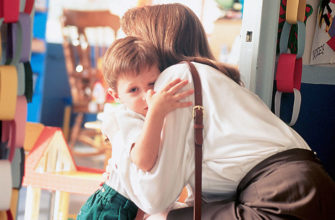



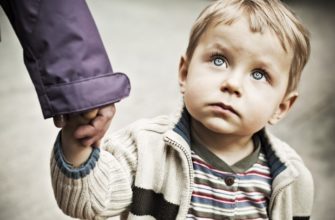
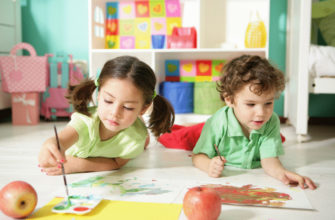
My son got used to the kindergarten for exactly 3 weeks. On the recommendation of a pediatrician, I started giving Tenoten children somewhere in 2 weeks. And we were lucky with the teacher. She led my crying son straight into the group so that he would be distracted by other children and toys. And I think that is right. Do not stretch the separation from the child, because it is only harder for him.
Yes, indeed, how many tears we had when we had to get up and go somewhere in the morning, and in the kindergarten, before my departure, there were generally tantrums, but then my son began to take my son away and the problem itself was solved, as it is said in one of the paragraphs of the article. Everything is not so scary, it just takes time to adapt.
In the kindergarten they called me harmful and no one was friends with me. Now I am in 7th grade, and I communicate only with two fingers. Due to psychological trauma in deep childhood, my mother all the time says “Communicate with the class, gossip with girls”, but I can’t